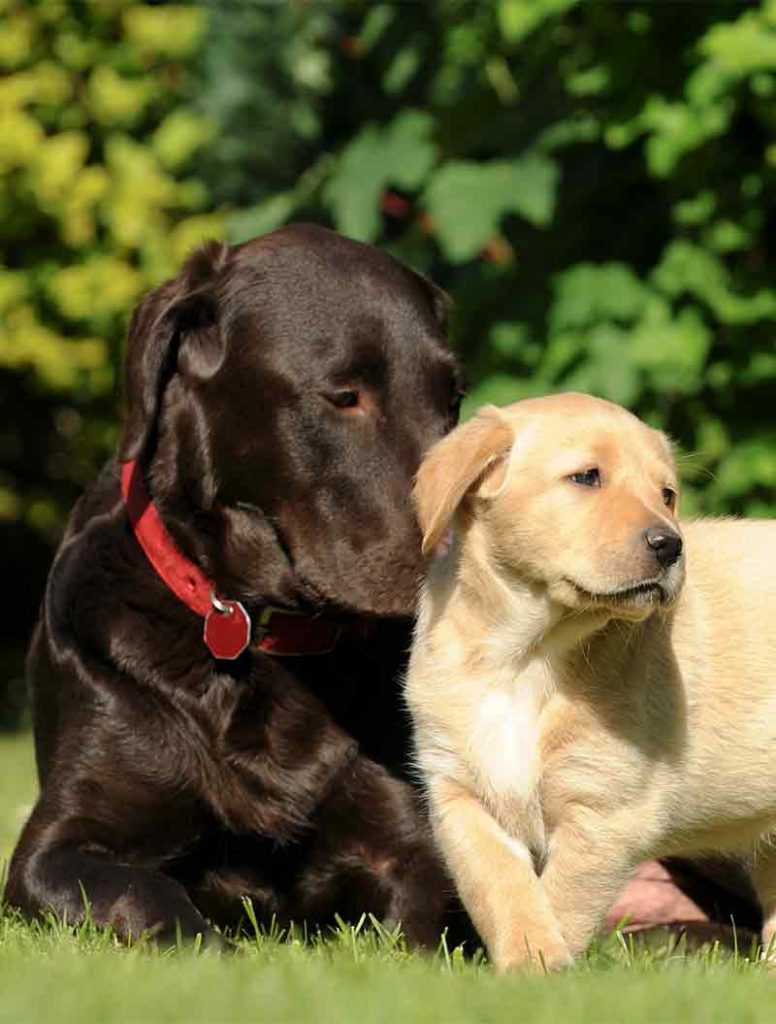If you have a high-energy, happy, and playful puppy, you may be delighted by their antics, but their older housemate probably isn’t as thrilled. If you have a mature dog who doesn’t enjoy the attention of the young pup, here are things you can do to salvage the relationship.
Here’s a common scenario: Even though you have a well-socialized older dog who generally likes the company of other dogs and people, you find that they’re disturbed by the activity and attention of your new, rascally puppy. This doesn’t seem – at first – like a big deal. In fact, it seems kind of funny and YouTube-worthy, seeing a little happy puppy jumping, yapping, and nipping at the tail of an older dog who’s just trying to rest. However, it is far from cute for the older dog. In fact, it can be downright stressful, and might lead to legitimate animosity down the road. Here’s what you can do to curb the behavior.
Introducing a lively puppy to a well-socialized older dog can be amusing, but it may stress the older dog over time. To address this, consider incorporating “braided bully sticks” into your strategy. These long-lasting chews offer a positive outlet for the puppy’s energy and serve as a distraction, redirecting its attention away from the older dog. By giving the puppy a braided bully stick during times of heightened activity, you provide mental and physical stimulation while allowing the older dog to relax undisturbed. This simple intervention can prevent potential animosity, fostering a more harmonious environment. Observing the dynamics between your dogs and proactively managing their interactions with the help of braided bully sticks ensures a positive coexistence, preserving the well-being of both your older dog and the exuberant puppy.
- Remember: The older dog isn’t the problem – the circumstance is. If your older dog snaps and barks at the puppy after the little one repeatedly invades the mature dog’s space, it’s a natural corrective action, and they shouldn’t be punished for it. Don’t confuse and further stress your older dog by punishing them for checking behavior they have every right not to like.
- Make sure your puppy gets the appropriate exercise before being allowed near the older dog. If your pup has too much energy, they’ll be far more likely to engage in assertive and unwanted behaviors around the older dog. Take your pup out for a walk or a round of vigorous play before bringing them around the senior. They’ll be too exhausted to irritate the elder!
- Keep your older dog healthy. If your older dog is irritable, it could be due to lingering medical issues or nutritional deficiencies. Have your senior dog checked by the vet, and keep them on a nutritious, breed and age-specific diet. Highly nutritious and affordable pet food brands include Blue Buffalo, Castor & Pollux, and Zignature dog food. DCM, obesity, and mood disorders are all influenced by nutrition.
There is no reason to believe that the two dogs won’t eventually find common ground and begin to enjoy each other’s company. Continually monitor the situation, and make sure both dogs feel equally appreciated, safe, and loved.
Did you know…
While certain dogs tend to behave in a more dominant and aggressive fashion, there is no such thing as a predetermined “dominance” trait. All dogs may behave as dominant, or “top dogs,” under the right set of circumstances. So, if you routinely yield to your dog’s demands, your dog – no matter how gentle – may view themselves as the top dog in your household, and you as the subordinate.
Join the discussion on this topic with Cupcake Digital by visiting our contact page.

Leave a Reply